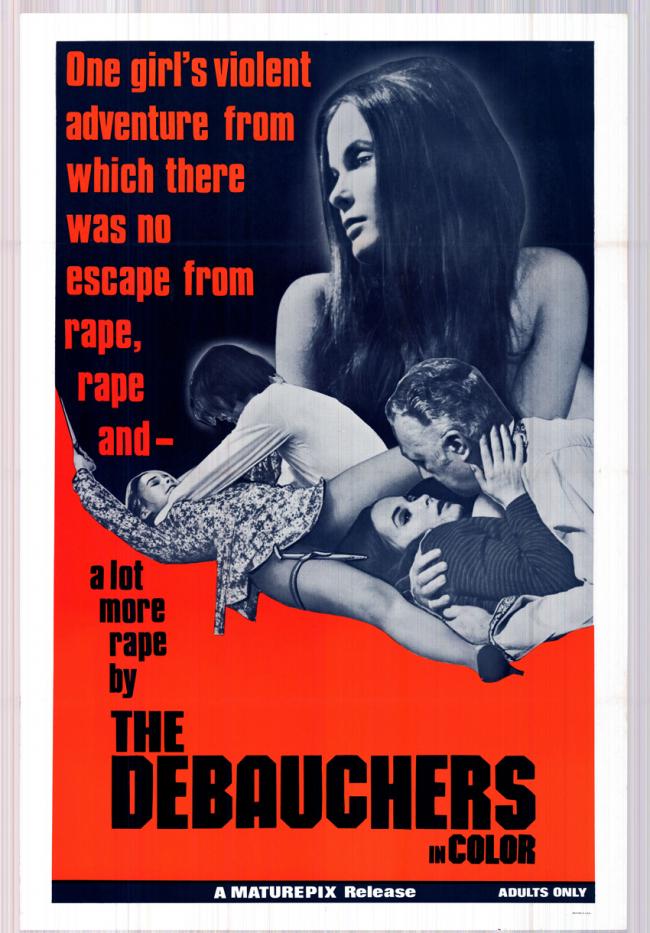Reviews
The Debauchers (1971)
The Debauchers (1971)
Hindsight is a beautiful thing. Tempting though it may be to read The Debauchers as some sort of prescient “roman à clef” as to the tragic fate that befell its lovely leading lady at the behest of her wicked spouse, still free from facial hair yet soon sporting the whiskers to twirl for maximum evil effect, as the seventies dawned the Russells were easily hardcore’s most harmonious couple, free-spirited love children who would fuck for a buck without a care in the world. The quintessential hot hippie chick and cuteness personified, Tina quickly rose to the top of the heap with Jason seeming very much the supportive husband for the world to witness, neither one missing a beat when it came to expressing their limitless devotion to the other in press or public. Their fornication fairy tale ground to a cruel halt when Jason laid eyes on a then underage Jean Jennings while producing Armand Weston’s S&M flavored The Defiance of Good in 1974. This alienation of affection drove Tina to drink, if not quite causing then certainly contributing to her untimely death from stomach cancer in 1981 at the all too tender age of 32, as Jason would now put her down with equal passion previously reserved for securing stardom. Substance abuse reducing her to enforced unemployment, looks sadly dwindling at breakneck speed, she was to suffer the ultimate humiliation – in a twist right out of Edith Wharton – as her former mate acquired her services as make up person for his current paramour, a job she unfortunately was in no position to turn down…
Bearing in mind this downward spiral, The Debauchers makes for mighty uncomfortable viewing indeed, cynically charting the disintegration of a happy couple, albeit strapped for cash, through their involvement in the world of porn and worse – more on that in a minute – and the easy money it brings. Director Sidney Knight was no stranger to the sordid and downbeat, his disillusioned disenchantment with human nature someday surely gaining him the long overdue status of an early adult “auteur”. Straddling the fence between softcore simulation and hardcore penetration as befitting this transitional stage, he would soon pass on the sexploitation silliness of fledgling endeavors like Love Is Where It’s At and Girls That Do for the topical treatment of the Vietnam war and its ugly psychological side effects on the men fighting it, the ramifications of which were just trickling down in public consciousness. This theme would quickly grow into an all purpose excuse for anti-social behavior in mainstream cinema but received one of its most disturbing appropriations in Knight’s 1971 The Soldier’s Wife starring real life husband and wife Patrick Wright and Tallie Cochrane as a couple turning to rape as the cure for the husband’s shell shock induced impotence ! Its direct companion piece presumably provides a valuable clue to the director’s “real world” identity. Following a few generic late sixties sexploiters (The Girl Grabbers, To Hex With Sex), fledgling filmmaker Simon Nuchtern sought to up the ante with his self-produced impassioned anti war plea entitled Cowards. In a last ditch effort to recoup costs careening out of control, he sold the film to notorious dirty movie distributor William Mishkin who spliced this earnest effort into something eventually called Love-In ’72, routinely attributed to Knight (or Nuchtern slaving to salvage his labor of love ?) and Karl Hansen who was to become porn purveyor “Kemal Horulu”. Assumptions and allegations aside, Nuchtern returned to the form with 1984’s New York Nights, another glossy spin on La Ronde for the cable crowd, yet remains primarily remembered for his 3D slasher Silent Madness from that same year.
Although never explicitly stated, the Vietnam trauma hovers ominously over The Debauchers and its companion piece The Morning After (in which a sleazy nightclub owner investigates the death of his stripper sister at the hands of a sex killer) inasmuch as it testifies to a country’s loss of innocence when the flower power mantra of peace and love got trampled underfoot by the bloodshed taking place overseas, embedding the idea in the nation’s psyche that it was now truly impossible to ever go home again. Functioning almost as an allegory, The Debauchers pits jaded cynical wealth against penniless naivete with no chance of a happy ending. Making out while skimming through the job offers, dirt poor May and Jack Carey only want to score $1,000 to buy a stock car as their pathetic pipe dream meal ticket when coming across an ad requesting open-minded models for “experimental art films”. A sucker for her man in both senses of the term, mirroring Tina’s real life dependency that was to prove her downfall, May agrees to “read” for the proposed part which promises to pay $250 a day for a single week shoot, provided she stay on the premises presided over by manipulative millionaire Tom Waters (an awe-inspiring performance by alleged one shot Claude Rube), euphemistically described as “peculiar” by his in house shrink Doctor Clayton, played by paunchy middle-aged Knight regular Daniel Harin who looks like a clean shaven Gerard Damiano. Ordering May to strip and pleasure herself, Rube breathlessly berates the credibly terrified Tina for not giving him what he wants. Unable to leave, that night she’s on the phone tearfully pleading Jack to come to her rescue. When he turns up, Waters just throws money at him, literally, changing his mind at a moment’s notice.
While the film’s baiting tagline (“One girl’s violent adventure from which there was no escape from rape, rape and a lot more rape by…The Debauchers”) suggests traditional roughie territory, the injustice inflicted on May’s character turns out to be way more sophisticated and – ironically, perhaps – morally bankrupt than the mere physical subordination the subgenre frequently flirted with. When May cries rape in the wake of her remunerated if still reluctant sexual performance with her husband, an act almost ignored in favor of Waters’s maid and butler (one shot wonders Daria Barton and Terry De Lane respectively) enthusiastically sixty-nining on the bed beside them, this should be interpreted metaphorically – in the notable absence of coercion – as Jack’s betrayal of their love as the pure antidote to the materialism that preoccupies and poisons surrounding society. Even though the abuse is constant, it’s primarily verbal or threatening (such as when Waters brandishes a shotgun to keep May in line) rather than physical, which will undoubtedly displease the roughie connoisseur. As May falls apart, Tina’s acting – tentative at first, as befitting an early performance (Jason claimed it was their first, which might be the case as far as features were concerned since they had definitely already done loops and inserts) – improves no end, assuring audiences are firmly on her side when the shit comes down.
***Spoilers ahead*** Giving it up to the doctor, who claims to be just as much of a captive as she is due to incriminating evidence Waters blackmails him with, May learns what the demented director meant by “experimental” as he plans to pay Jack to snuff her out in the film’s final scene, proving that everyone has his price to perform even the most unspeakable perversion. Departing from formula that was yet to take root in 1971, she seeks solace from the less than forthcoming domestic only as a means to secure a huge kitchen knife rather than the expected girl/girl scenario that would have been obligatory just a few years down the line. As Jack attempts to drown her in the outdoor swimming pool, May stabs him with Waters indifferent as to who winds up dead, only affirming that she has now “given him what he wanted”… ***End of spoilers***
Lulled into a faux feeling of familiarity by its mock Warhol type early stages, seeming more like a series of improvised acting class exercises leaving poor Tina apparently (and deliberately) out of her depth, viewers are drawn almost unnoticeably towards the narrative’s darker development and a shock ending that, while telegraphed in advance, still freezes the blood. Hall of mirrors turnaround film within a film conclusion may very well have influenced Paul Thomas’s lauded labyrinthine Fade to Black and its equally convoluted sequel three decades later, making Knight’s as of yet unheralded achievement all the more impressive as there was precious little to compare with at the time. Handheld camera work by regular collaborator Robert Morgenstern provides the material with well- judged, often literally in-your-face urgency. Like screenwriter William Ray and producer Jean-Jacques Robeau (a deserved ribbing of arthouse snobbery perhaps ?), this credit only appears in conjunction with this director’s body of work, feeding the suspicion that all of these may represent varying facets of a sole filmmaker’s versatile virtuosity.
Directed and edited by Sidney Knight. Written by William Ray. Produced by Jean-Jacques Robeau for Mature Pictures Corporation. Photographed by Robert Morgenstern. Starring Tina Russell (May Carey), Jason Russell (Jack Carey), Claude Rube (Tom Waters), Daniel Harin (Dr. Clayton), Daria Barton (Joan, the Maid) and Terry De Lane (Frank, the Butler). Running time : 76 minutes.
By Dries Vermeulen

